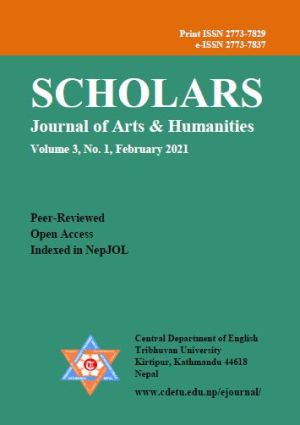Anthropocentric Hubris and Ecological Reversal in J.G. Ballard’s The Drought
DOI:
https://doi.org/10.3126/sjah.v3i1.35378Keywords:
Ecological crisis, industrialization, anthropocentrism, economy, climate changeAbstract
This paper attempts to analyze anthropocentric hubris and ecological reversal in J.G. Ballard’s The Drought by applying ecocritical perspective. In the context of growing environmental concern in literary studies, this paper aims to investigate how the human-nature relationship is presented in J.G. Ballard’s The Drought. The book depicts a hypothetical world turning into a global desert due to human- induced climate change. The industrial waste released into the rivers and seas has interrupted the evaporation cycle. As a consequence, all lives including humans and non-humans are threatened. To analyze this novel, the ecocritical insights developed by Lawrence Buell, Lynn White, Val Plumwood and Vandana Shiva have been used as theoretical parameters. Unquestionably, this novel strives to cultivate environmental consciousness among readers and greater urges to save the planet by projecting the futuristic apocalyptic scenarios and situating all biotic and abiotic components on the verge of extinction. However, this narrative eventually creates a bit of illusion among readers by restoring the hydrological cycle without making characters ecologically aware and morally obliged towards nature. Hence, the researcher believes that until and unless human beings develop ecological self, the avoidance of ecological reversal is unachievable.
Downloads
Downloads
Published
How to Cite
Issue
Section
License
© Central Department of English, Tribhuvan University and Authors




